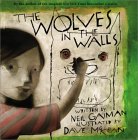
****The Wolves in the Walls
by Neil Gaiman
illustrated by Dave McKean
Reviewed November 24,
2003.
HarperCollins Publishers, 2003. 56 pages.
A Sonderbooks’ Stand-out of 2003:
#6, Children's Fantasy
Here’s a dark, rather scary tale about facing fears and triumphing
over them.
Lucy hears noises in the walls of her family’s old house.
Her mother thinks it’s mice. Her father thinks it’s rats.
Her brother thinks it’s bats. They’re sure that Lucy’s wrong, that
it can’t be wolves. Everybody knows that when the wolves come out
of the walls, then it’s all over.
Well, the wolves do come out of the walls. They take over
Lucy’s house, and her family must flee to the garden. After Lucy
goes back to recover her pig puppet, she discovers that there’s plenty
of room for them in the walls. So the family goes to live in the
walls, much to the fear of the wolves. For the wolves know that if
the people come out of the walls, it’s all over. And indeed it is.
For the wolves.
The illustrations of this book are magnificent and amazing, making
the entire book a work of art. They include photos mingled with
drawing and capture exactly the right mood throughout. Interestingly,
the wolves are cartoon, although their eyes, peering out of the walls,
are photorealistic
The book has a mythic feel. The family’s matter-of-fact treatment
of the wolves as entirely real gives the story a powerful impact.
There are also delightful silly touches throughout that are taken perfectly
seriously, such as the Queen of Melanesia, who had dropped by to help with
the gardening.
This book is a bit of a problem for a librarian. Where do
you shelve it? It’s in the format of a longish picture book.
However, you wouldn’t want to shelve it with the picture books, since
you wouldn’t want it to fall into the hands of, say, a three-year-old,
and give him nightmares.
In trying to decide what age will thoroughly enjoy this book rather
than be frightened by it, I think the key is that the child needs to be
old enough to know and firmly understand that wolves can’t really live
in the walls of houses, say at four or five. (Use your own judgment
with your own child!) Once a child is old enough to understand that
basic fact, the scariness (and underlying silliness?) of the story will
give him a delightful shiver and make him enjoy it all the more.
On a side note, my 9-year-old son and I enjoyed the fact that Lucy’s
father is a professional tuba player, since my husband is as well.
My son noticed that the illustrator even had the character holding and
playing the tuba authentically, unlike many illustrations of tuba players.
I found the picture of Lucy’s father fleeing the house with his tuba
on one arm and his child on the other surprisingly reminiscent of a night
twelve years ago when we had a fire in the next-door apartment.
(The tuba had cost $6000 at purchase and appreciates in value, so I fully
supported his protectiveness.)
Unfortunately, the author lost some of this verisimilitude when
he had the father trade in his second-best tuba at the end for a sousaphone,
which he had always wanted. Sousaphones are marching band instruments,
are what many tuba players learn on, and are disdained by concert musicians.
(Besides, when Lucy’s father runs out of the house with his best tuba,
the picture is actually of a sousaphone.) I must admit that I doubt
that this seemed inauthentic for very many other people. It was
refreshing that at least the tuba playing was presented as a father’s
ordinary job and not as a big joke.
Reviews of other books by Neil Gaiman:
Fortunately, the Milk
The Graveyard Book
Odd and the Frost Giants
Coraline
The Sleeper and the Spindle
Hansel & Gretel
Stardust
Norse Mythology
Art Matters
Copyright © 2003 Sondra Eklund.
All rights reserved.
-top of page-